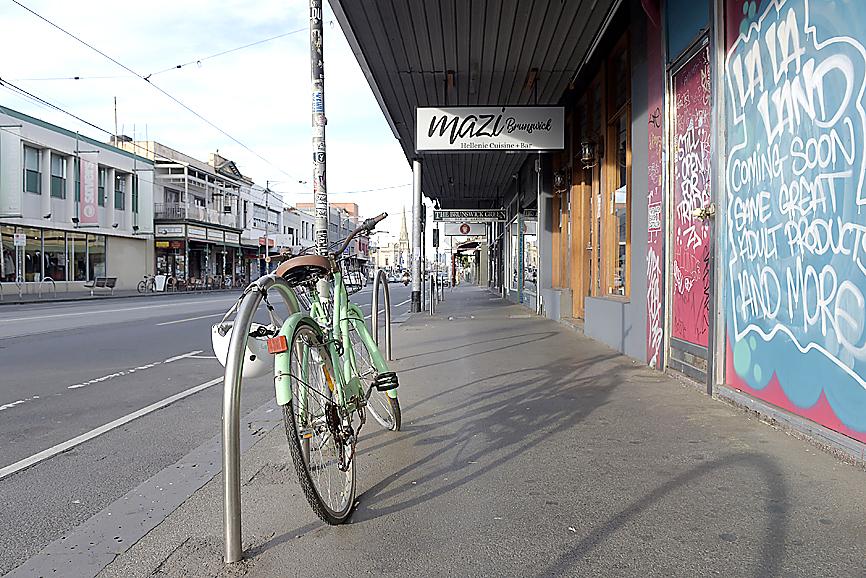Australia house prices fell the most in 16 months last month and face “significant” downside risk as mortgage holidays and government wage subsidies expire in coming months.
Property values in major cities fell 0.8 percent last month, the steepest decline since February last year, CoreLogic Inc data released yesterday showed.
The slide was led by Perth and Melbourne, which is at the center of a new spike in COVID-19 cases that has prompted the government to lock down parts of the city.

Photo: Bloomberg
“Despite the early signs of improved economic activity and a lift in housing turnover, the downside risk remains significant,” CoreLogic head of research Tim Lawless said. “The recent rise of active virus cases in Victoria is a reminder that the potential risk of a second wave remains a stark reality.”
The housing market faces a further test later this year, when current extraordinary levels of government and bank assistance start to wind down.
More than 485,000 home borrowers are on payment holidays, while about 3.5 million workers are on government wage subsidies, with both programs helping avoid the need for forced sales that could push down prices.
The wage subsidies are set to end in September, while banks might also toughen up criteria for borrowers wanting to extend the initial six-month payment deferrals.
“Eventually, the economy and borrowers will need to abide by market forces,” Lawless said. “This is when we could see a rise in mortgage arrears and the potential for a lift in urgent or forced sales.”
While Australia’s relative success in containing the virus means the economy is reopening quicker than in many other countries, the after-effects might linger for years.
A second wave of infections that slows or reverses the reopening could also set back the recovery.

MULTIFACETED: A task force has analyzed possible scenarios and created responses to assist domestic industries in dealing with US tariffs, the economics minister said The Executive Yuan is tomorrow to announce countermeasures to US President Donald Trump’s planned reciprocal tariffs, although the details of the plan would not be made public until Monday next week, Minister of Economic Affairs J.W. Kuo (郭智輝) said yesterday. The Cabinet established an economic and trade task force in November last year to deal with US trade and tariff related issues, Kuo told reporters outside the legislature in Taipei. The task force has been analyzing and evaluating all kinds of scenarios to identify suitable responses and determine how best to assist domestic industries in managing the effects of Trump’s tariffs, he

TIGHT-LIPPED: UMC said it had no merger plans at the moment, after Nikkei Asia reported that the firm and GlobalFoundries were considering restarting merger talks United Microelectronics Corp (UMC, 聯電), the world’s No. 4 contract chipmaker, yesterday launched a new US$5 billion 12-inch chip factory in Singapore as part of its latest effort to diversify its manufacturing footprint amid growing geopolitical risks. The new factory, adjacent to UMC’s existing Singapore fab in the Pasir Res Wafer Fab Park, is scheduled to enter volume production next year, utilizing mature 22-nanometer and 28-nanometer process technologies, UMC said in a statement. The company plans to invest US$5 billion during the first phase of the new fab, which would have an installed capacity of 30,000 12-inch wafers per month, it said. The

Taiwan’s official purchasing managers’ index (PMI) last month rose 0.2 percentage points to 54.2, in a second consecutive month of expansion, thanks to front-loading demand intended to avoid potential US tariff hikes, the Chung-Hua Institution for Economic Research (CIER, 中華經濟研究院) said yesterday. While short-term demand appeared robust, uncertainties rose due to US President Donald Trump’s unpredictable trade policy, CIER president Lien Hsien-ming (連賢明) told a news conference in Taipei. Taiwan’s economy this year would be characterized by high-level fluctuations and the volatility would be wilder than most expect, Lien said Demand for electronics, particularly semiconductors, continues to benefit from US technology giants’ effort

‘SWASTICAR’: Tesla CEO Elon Musk’s close association with Donald Trump has prompted opponents to brand him a ‘Nazi’ and resulted in a dramatic drop in sales Demonstrators descended on Tesla Inc dealerships across the US, and in Europe and Canada on Saturday to protest company chief Elon Musk, who has amassed extraordinary power as a top adviser to US President Donald Trump. Waving signs with messages such as “Musk is stealing our money” and “Reclaim our country,” the protests largely took place peacefully following fiery episodes of vandalism on Tesla vehicles, dealerships and other facilities in recent weeks that US officials have denounced as terrorism. Hundreds rallied on Saturday outside the Tesla dealership in Manhattan. Some blasted Musk, the world’s richest man, while others demanded the shuttering of his